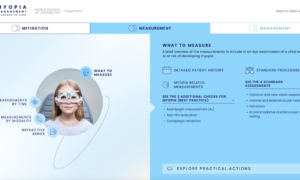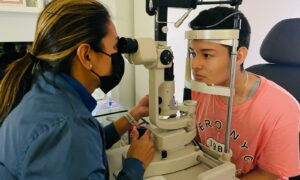September 1, 2022
By Geetha Sravani, PhD Candidate, Brien Holden Vision Institute

Myopia is a leading cause of visual impairment and blindness throughout the world. Behavioral, pharmacological, and optical interventions are the current treatment modalities for myopia control. However, all of them have limitations. The dramatic increase in myopia incidence, partly due to COVID-19 home confinement and increased online viewing time, emphasizes the importance of identifying a safe and effective approach to myopia control. The role of nutritional factors has been considered but is inconclusive.1
Pan et al. (2021) conducted a study to investigate the therapeutic effect of dietary supplements of omega-3 polyunsaturated fatty acids (ω-3 PUFAs) on myopia development in animal models and humans, and the effects of docosahexaenoic acid (DHA) and eicosapentaenoic acid (EPA) on choroidal blood perfusion (ChBP) and scleral hypoxia in animal models.2
In this study, DHA (oral and injections) and EPA were used as ω-3 PUFAs. Results showed that daily gavage of 300 mg DHA plus 60 mg EFA significantly reduced the development of form deprivation and lens-induced myopia in guinea pigs and form deprivation myopia in mice. In addition, peribulbar injections of DHA also reduced the myopia progression in guinea pigs, which was accompanied by inhibition of the ChBP changes. Oral administration of ω-3 PUFAs partially attenuated the near-work-induced decreases in ChBP in human subjects. The authors suggest that ω-3 PUFA-induced changes could be critical for suppressing transdifferentiation of the scleral myofibroblasts and for maintaining the normal scleral extracellular matrix to inhibit myopia development. The researchers concluded that evidence from these animal and human studies suggests ω-3 PUFAs are potential and readily available candidates for myopia control.
Abstract
Dietary ω-3 Polyunsaturated Fatty Acids Are Protective for Myopia
Miaozhen Pan, Fei Zhao, Bintao Xie, Hao Wu, Sen Zhang, Cong Ye, Zhenqi Guan, Lin Kang, Yuqing Zhang, Xuan Zhou, Yi Lei, Qi Wang, Li Wang, Fan Yang, Chenchen Zhao, Jia Qu, Xiangtian Zhou
Significance: Myopia is a leading cause of visual impairment. However, a safe and accessible approach for myopia control is currently unavailable. In the present study, we demonstrated that dietary supplements of omega-3 polyunsaturated fatty acids (ω-3 PUFAs) attenuated myopia development in animal models. ω-3 PUFAs also ameliorated near-work–induced decreases in choroidal blood perfusion in young adults. Hence, when safety and effectiveness have been confirmed in future clinical studies, ω-3 PUFAs should be attractive candidates for myopia control in humans.
Myopia is a leading cause of visual impairment and blindness worldwide. However, a safe and accessible myopia control and prevention approach is currently unavailable. Here, we investigated the therapeutic effect of dietary supplements of ω-3 PUFAs on myopia progression in animal models and on decreases in choroidal blood perfusion (ChBP) caused by near work, a risk factor for myopia in young adults. We demonstrated that daily gavage of ω-3 PUFAs (300 mg docosahexaenoic acid [DHA] plus 60 mg eicosapentaenoic acid [EPA]) significantly attenuated the development of form deprivation myopia in guinea pigs and mice, as well as of lens-induced myopia in guinea pigs. Peribulbar injections of DHA also inhibited myopia progression in form-deprived guinea pigs. The suppression of myopia in guinea pigs was accompanied by inhibition of the “ChBP reduction–scleral hypoxia cascade.” Additionally, treatment with DHA or EPA antagonized hypoxia-induced myofibroblast transdifferentiation in cultured human scleral fibroblasts. In human subjects, oral administration of ω-3 PUFAs partially alleviated the near-work–induced decreases in ChBP. Therefore, evidence from these animal and human studies suggests ω-3 PUFAs are potential and readily available candidates for myopia control.
Pan, M., Zhao, F., Xie, B., Wu, H., Zhang, S., Ye, C., … & Zhou, X. (2021). Dietary ω-3 polyunsaturated fatty acids are protective for myopia. Proceedings of the National Academy of Sciences, 118(43), e2104689118.
DOI: https://doi.org/10.1073/pnas.2104689118
 |
Geetha Sravani is a PhD candidate at the Brien Holden Vision Institute, supervised by Prof. Padmaja Sankaridurg and Arthur Back. Her research focuses on the role of pupillary responses in myopia. |
References
1 Du B., et al.., A prospective study of serum metabolomic and lipidomic changes in myopic children and adolescents. Exp. Eye Res. 199, 108182 (2020).
2 Pan M, Zhao F, Xie B, et al. Dietary ω-3 polyunsaturated fatty acids are protective for myopia. Proc Natl Acad Sci U S A. Oct 26, 2021;118(43) doi:10.1073/pnas.2104689118.













